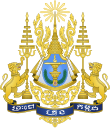Our website is made possible by displaying online advertisements to our visitors.
Please consider supporting us by disabling your ad blocker.
Judiciary of Cambodia
| This article is part of a series on the |
| Politics of Cambodia |
|---|
 |
The Judiciary of Cambodia is independent from the rest of the government of Cambodia, as specified by the Cambodian Constitution. The judiciary follows civil law tradition, the instruction being entrusted to a judge and the prosecutors contenting themselves with requesting the application of the law.
Courts and tribunals in Cambodia regularly face a lack of resources, both financial and human, a ferment of corruption and clientelism that eat away at the whole of society. The difficulty of access for the poorest also favors the resistance of traditional methods of conflict resolution, based on the intermediary of a person whose moral authority, unlike that of the judge, is not contested by neither of the two parties (village, district, pagoda chiefs, etc.), de facto creating a two-tier system, one, official, reserved for foreigners and urban elites, the other, informal, for the most part population.
Previous Page Next Page


